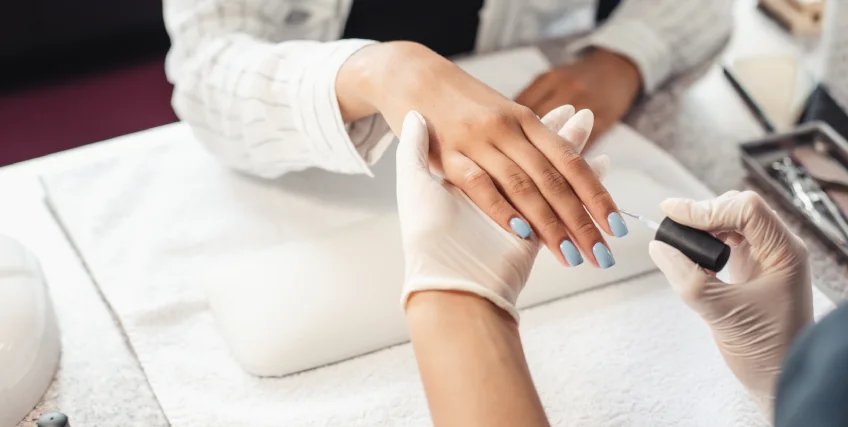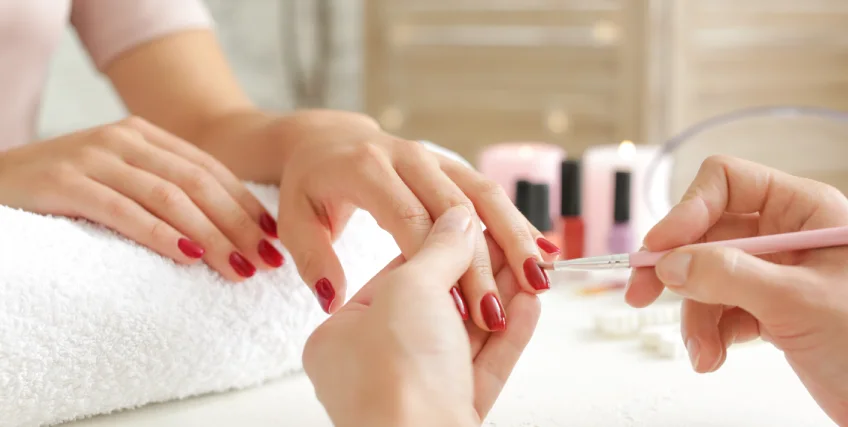Fast, Flexible Loans
To Power Your Nail Salon’s Next Step.
Looking for Business Financing?
Apply now for flexible business financing. Biz2Credit offers term loans, revenue-based financing, lines of credit, and commercial real estate loans to qualified businesses.
Set up a Biz2Credit account and apply for business financing
The nail salon industry has bounced back strong post-pandemic, but staying profitable is harder than it looks. From rising rent to increasing supplier costs, nail salon owners are constantly dealing with shifting expenses. With trends like gel extensions and custom nail art becoming the norm, even the smallest salons are expected to deliver premium services.
That means stocking up on high-end products, investing in proper ventilation systems, and maintaining a welcoming space. All of this requires steady working capital, but it’s not always easy to pull from your profits, especially during slow months.
That’s where loans for nail salons come in. Whether you're looking to open a new location, upgrade your salon equipment, or build an emergency buffer, financing can help you do it without draining your reserves. Most small business owners don’t have a lump sum saved for big upgrades, which is why borrowing makes sense when done right.
Access to small business loan financing isn’t just about cash flow; it’s about staying competitive in a crowded beauty market. And with interest rates changing and inflation affecting supply prices, planning ahead with the right loan program can give you a real edge.
The beauty industry is growing steadily in the U.S., with nail services generating billions each year Statista. Having access to the right funding options can help you grow, serve more clients, and hit your long-term business goals without delay.
Real Challenges Nail Salons Face (and How Financing Can Help)
Running a nail salon isn’t just about polish and pedicures. Behind the scenes, owners juggle rising costs, staff issues, and the pressure to stay trendy.
Rent and Commercial Real Estate Costs
Securing the right space in a high-footfall area can eat into your working capital fast. Commercial leases are going up, especially in metro areas. If you’re renewing a lease or expanding into a second location, a lack of funds can stall growth. Many business owners use loans for nail salons to cover upfront rent payments or buildouts. Having capital ready helps you negotiate better lease terms and avoid last-minute disruptions to your services or foot traffic.
Equipment Replacement and Maintenance
From pedicure chairs to UV lamps, salon tools don’t come cheap, and they don’t last forever. When something breaks down, it can halt services and income. Relying only on revenue can delay repairs. But with the right nail salon financing, you can replace or repair equipment without dipping into reserves. Some even use equipment loans for bulk purchases when launching seasonal offers or redesigning interiors to match new trends.
Staffing Skilled Nail Technicians
Hiring skilled technicians means offering competitive pay, proper tools, and a good work environment. That’s tough when your cash flow is inconsistent. Onboarding new staff and offering training also adds to costs. A nail salon loan can help you build a reliable team without worrying about monthly dips in income. Good staff retention leads to loyal customers and stronger reviews - both critical in the beauty industry.
Seasonal Slumps and Cash Flow Gaps
Foot traffic can drop in off-seasons, yet operating expenses remain constant. Whether it’s January slowdowns or summer lulls, many salon owners face gaps in revenue. Having access to short-term financing or a business line of credit can help keep things moving. These loan options cover utilities, supplies, and payroll during low-revenue months, helping you avoid high-interest credit card debt.
Smart Ways to Use a Nail Salon Loan
Getting approved is just one part. Knowing where to use that funding can make all the difference in hitting your business targets and staying ahead.
Lease or Renovate Your Salon
Upgrading your salon space can attract more walk-ins and help you compete with trendier salons nearby. Whether you're moving into a new unit or renovating your current one, lease deposits and construction costs add up fast. Many salon business owners use loans for nail salons to cover these one-time expenses. The right ambiance can boost client satisfaction, grow your online reviews, and drive more bookings. Some even combine salon financing with commercial real estate loans for long-term expansion.
Buy New Salon Equipment
Modern chairs, dryers, sanitization stations, and air filtration systems are key for both client safety and comfort. But salon equipment costs thousands and wears out over time. Instead of relying on savings, you can use equipment financing to buy or lease what you need. Many small business owners use nail salon loans to spread out payments for new equipment without pausing services. It’s one of the top ways to future-proof your setup.
Stock Up on Manicure Products
Nail art trends shift fast. Whether it’s chrome powder, dip kits, or eco-friendly polishes, staying stocked helps you offer what's in demand. But bulk orders can drain your budget. Working capital from loans nail salon owners apply for can cover this without stressing your cash flow. It also ensures you never turn away a client because you're out of supplies.
Cover Payroll and Operating Expenses
Even on slow weeks, your bills don’t stop. From payroll and rent to cleaning supplies and utilities, operating expenses hit hard. This is where a short-term loan or business line of credit can come in handy. Many beauty salon owners use these to stay on top of costs during low seasons. With flexible repayment terms, you're not scrambling every month.
Invest in Marketing or Online Bookings
Setting up your salon on Instagram, Google, or booking platforms requires more than time. You need ad budgets, graphic help, and sometimes, agency support. A nail salon loan gives you the funds to run ads, create local SEO campaigns, or even set up online appointments. Digital visibility is crucial in today’s crowded beauty business space.
Build a Buffer for Short-Term Gaps
Emergencies don’t send warnings. HVAC failure? A technician quits midweek? A small business loan helps you build a rainy-day fund, so operations don’t stop. Some loan programs even let you draw only what you need, like a business line of credit, making it easier to manage unexpected dips.
Top Financing Options Every Nail Salon Owner Should Know About
Not every loan fits every salon. It’s important to understand the different loan types available so you can choose what supports your goals and operations best.
Term Loans
A term loan is one of the most common forms of business financing. You receive a lump sum upfront and repay it over a set time with interest. It’s great for large purchases like renovations or a new location. Loans for nail salons in this category often offer fixed repayment terms, which makes budgeting easier. If your credit history is solid, you might qualify for competitive interest rates. Term loans work well for established salon businesses with predictable revenue.
Business Line of Credit
Unlike a lump sum, a business line of credit works like a credit card. You get approved for a certain loan amount, but you only pay interest on what you use. It’s ideal for covering irregular costs like emergency repairs or restocking inventory. Nail salon owners prefer this flexibility when managing cash flow. It’s also helpful during off-peak months when income drops but operating expenses continue.
Equipment Financing
Need to purchase new chairs, nail dryers, or a sterilization unit? Equipment loans help you pay for them over time instead of all at once. The gear itself acts as collateral, making these easier to get approved for. This type of nail salon financing allows owners to stay current with industry standards and client expectations without risking their cash reserves.
SBA 7(a) and Microloans
Backed by the Small Business Administration, SBA loans offer low rates and long repayment periods. The SBA 7(a) loan is great for bigger funding needs, while microloans are meant for startup or small-scale upgrades. While the application process takes time, these options are considered stable and low-risk.
Merchant Cash Advances
This is not a loan in the traditional sense. Instead, it’s an advance on your future credit card sales. The lender takes a portion of your daily sales until the balance is repaid. Though it’s fast and easy to access, it often comes with higher fees. Nail salon loan seekers should be cautious about the total cost. It’s best for short-term needs or when other options aren’t available due to bad credit.
Commercial Real Estate Loans
If you're planning to buy your salon space instead of leasing, this loan might work for you. These loans are structured similarly to mortgages and are used to finance the purchase or renovation of business properties. They often require detailed financial statements, a solid business plan, and a strong credit score. It's a long-term option suited for salons with high monthly revenue and growth stability.
The Real Pros and Cons of Taking Out a Loan for Your Nail Salon
Loans aren’t always good or bad. They’re a tool. The trick is knowing when and how to use them based on your business needs and cash flow.
Pros of Nail Salon Loans
Maintain Cash Flow Without Sacrificing Growth
Even profitable salons face dips in income. Loans help you move forward, whether you're adding new equipment, hiring staff, or handling slow months. Instead of holding back on improvements or staff expansion, you can keep operations stable. For many small business owners, this means peace of mind and room to breathe while still growing.
Build Better Credit Score Over Time
A well-managed loan builds your credit history and improves your personal credit score. This opens up better financing options in the future. Timely payments show lenders that you’re reliable and capable of handling larger loan amounts. It’s one of the easiest ways to boost your reputation in the eyes of banks and alternative lenders alike.
Finance Expansion Without Diluting Control
With loans for nail salons, you don’t give up equity in your business like you would with investors. You stay in control of decisions and profits. This makes debt financing attractive to salon owners who want to scale without partners. Whether you’re launching a second location or expanding into spa services, you stay the sole decision-maker.
Cons of Nail Salon Loans
Repayment Schedule Can Limit Flexibility
Even if business is slow, your monthly payments stay the same. This can strain your cash flow in tight months. If you don’t plan ahead, it could mean juggling bills or delaying payroll. It's why some borrowers prefer line of credit options with flexible payment structures for short-term coverage.
Higher Interest Rates for New or Bad Credit Borrowers
If your credit score is low or you’re just starting out, your rates might be higher. Some loan types also include origination fees or early repayment penalties. It’s important to compare repayment terms, understand the full cost, and read the fine print before signing anything.
Missed Payments Hurt Credit History
Late or missed payments can damage both your business credit and personal credit profile. It may limit future access to business funding, especially from traditional bank sources. This can affect your eligibility for bigger opportunities later, including SBA loans, microloans, or beauty salon loans with better terms.
What Lenders Look for When You Apply for a Nail Salon Loan
Getting approved isn’t about luck. Lenders check specific things before greenlighting loans for nail salons. Here's what you’ll need to get through the loan application stage.
Minimum Credit Score and History
Most lenders look for a credit score of at least 600, though some loan programs may require higher. Your credit history gives insight into how well you manage debt. It also affects the interest rates you're offered. A strong score may open doors to SBA loans, term loans, or even better repayment flexibility. If your score is low, work on reducing credit card debt and making timely payments before applying.
Proof of Revenue (Bank Statements and Tax Returns)
You’ll typically need 3 to 6 months of bank statements and 1–2 years of tax returns to show consistent income. Lenders want to know if your nail salon generates steady cash and can handle monthly payments. If you’re seasonal, you might also need to provide a cash flow forecast. Strong documentation helps prove that your business can repay the loan without defaulting.
Time in Business and Legal Documents
The longer you’ve operated your salon business, the better your approval odds. Many lenders prefer a track record of at least 6–12 months. Be ready to submit licenses, insurance papers, and incorporation documents. For newer salons, getting approved might mean offering collateral or a personal guarantee, especially when seeking larger loan amounts.
Solid Business Plan with Use of Funds
A well-written business plan shows you’ve done your homework. Lenders want to see where the money’s going and how it’ll support your growth. Break down how you’ll use the funds, whether it’s equipment financing, marketing, or expanding to a second location. Be realistic with projections and include a basic repayment schedule. If you’re not sure where to start, check out SCORE’s guide for free templates.
Trusted by Thousands of Small Business Owners in America.**
Simply because we get what you go through to build a business you believe in.
**Disclaimer: All stories are real, as told by real business owners. Customers do not receive monetary compensation for telling their stories.
From One Entrepreneur to Another: We Get You
We understand what's behind building a business you believe in.
All stories are real, as told by real business owners. Customers do not receive monetary compensation for telling their stories.



Articles on Loans for Nail Salon
How to Choose the Right Business Loan for Nail Salon Renovations
Nail salons aren’t just meant for trendy nail art, manicure, or pedicure services. The vibe of your space matters just as much as
Nail Salon Financing Smart Funding Options to Support Your Salon’s Success
In today’s time, a nail salon offers a creative and rewarding business opportunity. However, keeping it successful means planning for
Nail Salon Loans: How to Finance and Grow Your Beauty Business
Operating a nail salon in the U.S. requires much more than just creativity. Between rent, supplies, and staff wages, the expenses stack
FAQs on Loans for Nail Salon
1. Can I get a loan for my nail salon if I just started?
Depends on lender to lender, but your options may be limited. New salons often qualify for smaller loans like microloans or lines of credit. Strong personal credit helps.
2. Can I use the loan for salon equipment?
Many owners use equipment financing to purchase chairs, dryers, or sterilizers without hurting their cash flow.
3. Will I need collateral to qualify?
Some loan types do require it, especially if your business is new or has low revenue. Others are unsecured and based on creditworthiness.
4. Can I use a loan to cover payroll?
Many small business loan financing options help cover payroll, rent, and utilities during slow months or seasonal dips.
5. Is a business plan really required?
A clear plan improves your chances of getting approved and shows lenders you’re serious about growth.
Frequent searches leading to this page



